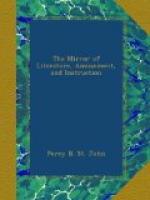As we love to “march in good order,” we begin with the plates, the most striking of which is the Frontispiece, Marcus Curtius, by Le Keux, from a design by Martin, which we are at a loss to describe. It requires a microscopic eye to fully appreciate all its beauties—yet the thousands of figures and the architectural background, are so clear and intelligible as to make our optic nerve sympathize with the labour of the artist. The next is a View on the Ganges, by Finden, after Daniell; Constancy, by Portbury, after Stephanoff, in which the female figure is loveliness personified; Eddystone during a Storm; the Proposal, a beautiful family group; the Cottage Kitchen, by Romney, after Witherington; and the Blind Piper, from a painting by Clennell, who, from too great anxiety in the pursuit of his profession, was some years since deprived of reason, which he has never recovered.
In the poetical department we notice the Retreat, some beautiful lines by J. Montgomery; Ellen Strathallan, a pathetic legend, by Mrs. Pickersgill; St. Mary of the Lows, by the Ettrick Shepherd; Xerxes, a beautiful composition, by C. Swain, Esq.; the Banks of the Ganges, a descriptive poem, by Capt. McNaghten; Lydford Bridge, a fearful incident, by the author of Dartmoor; Alice, a tale of merrie England, by W.H. Harrison; and two pleasing pieces by the talented editor. Our extract is
LANGSYNE.
BY DELTA.
Langsyne!—how doth the word come back
With magic meaning to the heart,
As Memory roams the sunny track,
From which Hope’s dreams were loath
to part!
No joy like by-past joy appears;
For what is gone we peak and pine.
Were life spun out a thousand years,
It could not match Langsyne!




